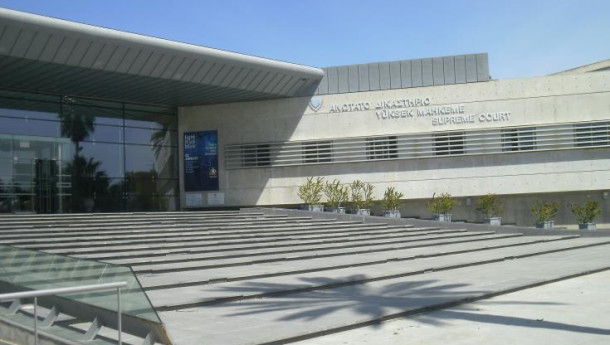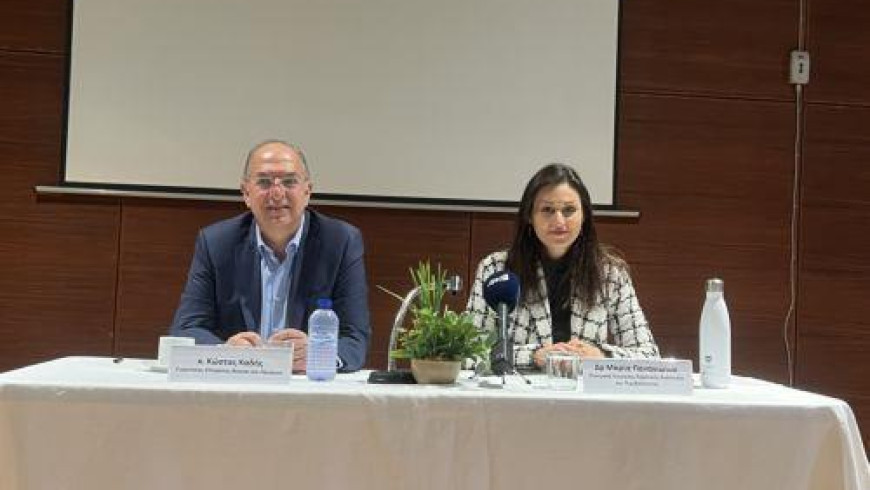
The establishment of an independent court service will contribute to the efficient delivery of justice, said Stefi Drakou, Minister of Justice and Public Order, at the Supreme Court on Wednesday.
Drakou was speaking at the closing ceremony which formally marked the completion of a project on the establishment of an independent court service for the re-engineering of the court registries, funded by the European Union and the Council of Europe and implemented by the Council of Europe.
The ceremony opened with a speech by the President of the Supreme Court Antonis Liatsos, who said that the comprehensive report of experts from Ireland’s Institute of Public Administration carried out in cooperation with the Supreme Court revealed the areas towards reforming Cyprus justice.
He added that by creating an independent court service, the Supreme Court is essentially discharged from its administrative duties, and it is then able to concentrate in its judicial actions.
Minister of Justice and Public Order Stefi Drakou said on her part that the government firmly believes that the establishment of an independent court service will effectively address administration challenges and serve the well-functioning of the courts, contributing to an efficient delivery of justice.
She added that this new administration will incorporate the current administration and support staff, but at the same time will identify other skills and competences that will need to be recruited. Furthermore, she said that the benefits from implementing new professional and administrative structures in the courts include more time for judges to focus on their judicial duties, better support to judges, better budgeting, planning, risk management, strategic planning and resources management, as well as better staff management and courts reform and modernization management.
According to the Justice Minister, during the last years concrete steps have been taken towards the holistic reform of the judicial system, 2022 being a milestone for the justice system with the establishment of the Supreme Constitutional Court and the Supreme Court, the new Court of Appeal, and the Commercial and Admiralty courts, which will provide a more functional and flexible highest level of justice towards achieving the goal of a quick delivery of justice.
She also referred to the backlog project, which has already exceeded the first target set in the Recovery and Resilience Fund, the new rules of civil procedure entering into force in September 2023, the e-justice system to be implemented in the coming months and the continuous training of judges.
We are moving towards the end of a long road, maybe with a slower pace than we would like, but definitely to the right direction, Drakou concluded, thanking the European Commission, the Council of Europe and all involved partners that contributed to the project’s completion.
Daniele Dotto, Deputy Director at the European Commission’s Directorate General for Structural Reform Support, said in his speech that the project was structured around two key objectives, firstly, the implementation of the recommendation of the functional review about the creation of an independent court service with the purpose of allowing judges to focus on their judicial duties, and secondly, the review and production of new processes in the court registries so as to improve their efficiency considering their role in case management.
An effective justice system is vital for a sustained economic development and growth as it can improve business planning, foster innovation and attract foreign investment, he continued, adding that in this context, the support the European Commission has provided to Cyprus in the last five years is important for both the country and the EU in general.
Dotto expressed his confidence that the Supreme Court will further pursue reform efforts, taking the necessary follow-up actions for the implementation of the suggestions and the activation of the tools provided by the experts towards the establishment of an independent court service, and thanked the Supreme Court and the Cypriot authorities for their excellent cooperation.
Frederic Dolt, Head of the Department for the Implementation of Human Rights at the Council of Europe, said in his speech that Cyprus, the European Union and the Council of Europe have been working together during the last three years on the implementation of joint projects, including on improving the efficiency of the judicial system.
He noted that the achievement of the project’s long-term outcomes and its impact will depend on the implementation stage, adding that is important that the establishment of the court service will happen smoothly and in coordination with other initiatives taking place in parallel.
For the Council of Europe, continued Dolt, working with the member states on the justice sector reform is of fundamental importance because the rule of law, on which European democracies rest, cannot be ensured without fair, efficient and accessible judicial systems, and stressed the importance of working with reliable partners, as it has been the case with Cyprus.
Elena Yurkina, Head of Unit on Innovative Solutions for Human Rights and Justice at the Council of Europe, presented the main deliverables and achievements of the project, which were the creation of a court service for the management and administration of courts and the introduction of new administrative processes in the court registries.
As regards the creation of the court service, according to Yurkina deliverables included an analysis report on the current organisational and governance structure of the courts and a high-level description of management and administration processes, recommendations on governance, management, structures, and administrative arrangements as well as an implementation roadmap for the first two years of setting up and operation.
In terms of the new administrative processes, deliverables included an ISO gap analysis and action plan, an evaluation report of processes in several registries (Nicosia, Larnaca, Famagusta) and areas for re-engineering, as well as a recommendation report with a detailed action plan connected with five stages for the court service establishment.
Adamantia Manta, Policy Officer at the European Commission’s Directorate General for Structural Reform Support, said in her presentation that the development of modern structures for the management of the courts must take place as soon as possible, within a governance and institutional context where the judiciary and the Supreme Court retain overall control over the policies and the strategic directions of the courts.
Establishing the court service as statutory agency with a representative board was proposed as the best solution for Cyprus in order to help the country address challenges recorded in the sector, continued Manta, adding that while there might be a need for a transition phase for its implementation before long-term benefits can be documented, the decision for its establishment must be taken now.
Finally, Former Supreme Court Judge and Reform Director George Erotocritou said in his remarks that the court service is the last of a series of reform projects funded by the European Commission, which were complemented by nationally funded projects, such as the e-justice, the separation of the Supreme Court and the creation of a new Court of Appeal among others, and they concern mainly civil justice, where reforms are expected to overhaul the system in a few years.
At the same time, he noted that planned reforms are not sufficient to modernize the entire court system, such as the criminal justice system, the courts of special jurisdiction and means of alternative dispute resolution, while the reform implementation rate in general has been rather slow in many cases and is often hampered by the frequent change of key people, resistance to change and a slow change of culture within and outside the system.
In order to bring about a change a culture, a strong commitment by all stakeholders is needed, as well as close coordination between parties concerned and for the Supreme Court and the Bar Association pass the necessary messages to all sides, concluded Erotocritou.














 3287.99
3287.99 1275.09
1275.09
